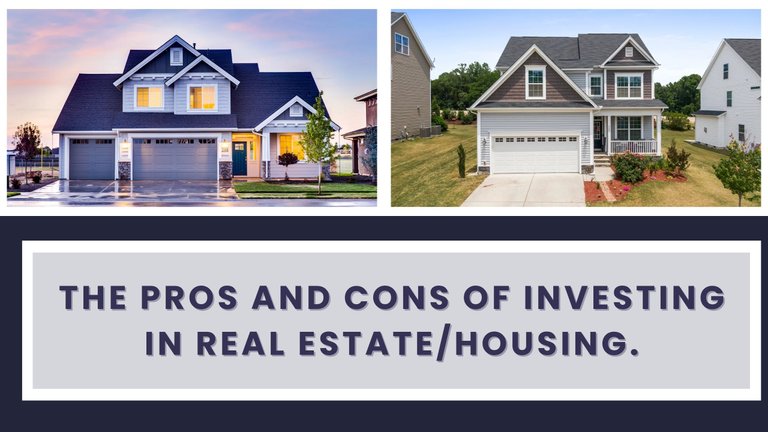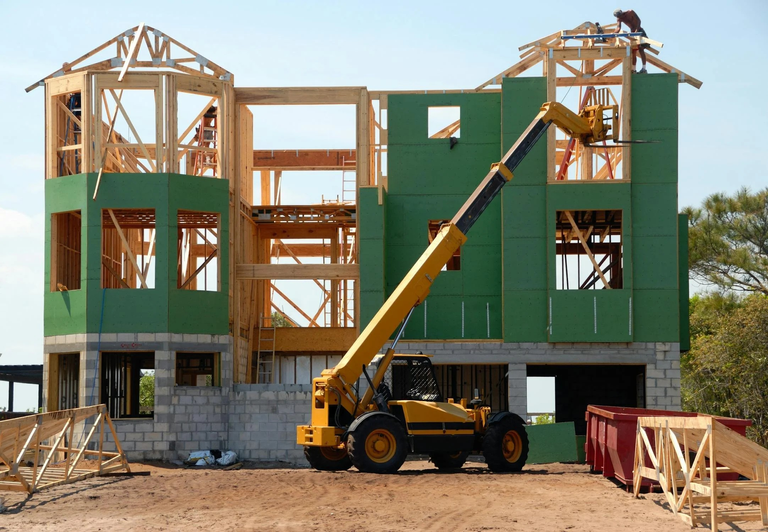ENG
There are some ways in which we can be entrepreneurs, and also, building a house or investing in housing is also part of it. You have different lands and properties, on which you will then be able to get different amounts of money. It's also an enterprise that makes money from it. Lucrative and easy also, but all you need is some money to build apartments, which you can either lease out to people or give out on rent to them, which they will then pay you for. But, you know, owning a house can sometimes be problematic because of the maintenance.

Why am I saying this? I am saying this because money is all we need for any business we venture into, even if it's a small business. The more you own a house, the more you will need to maintain it and the more you will spend money on it, but spending money on these maintenances can be a loss on the side of the house owner if care is not taken because sometimes you bring some occupants into the apartment, and then they come in and cause havoc to the equipments in the house.
What more can you do as an owner? Either you fix it, leave it, or ask the occupants themselves to fix it. When you fix it as the owner of the house, you will lose some money from that part, but you will recover it from the payment the occupants make. But will this cover the money you use or spend on maintaining the house? The answer to this is no, because there is no way you can spend money, and you will be able to recover all from your occupant's, especially when you take in the bad ones in that they do not value good things.

If you leave it for the occupants themselves to repair, they literally repair it because they are the ones who caused the damage themselves. As far as investing in housing, it is very good, and it makes you see the good and bad sides of it. I will share a little bit about this.
1 . The loss you get from investing in housing, aside from the profit, is also somewhat on the high side. I had a discussion with the caretaker of an apartment around my vicinity, who happens to be my friend, and I asked how he and the landlord had been able to cope with handling the occupant's house, and he said the landlord spends a lot of money to renovate the house, especially when the tenants ask for some things that the landlord didn't use in the house they stay in.
2 . Vacancy period: Ass a landlord investing in a housing enterprise, you suffer some free time because there won't be enough occupants to fill the house. Then there won't be income for the enterprise owner, and this would lead to a loss of income from that aspect.
Also, there is nothing that has a good side that doesn't have a bad side. Some of the good sides are:
1 . Having a passive income, be it yearly or quarterly. This way, you earn without having to go through stress.
2 . It's a means of appreciation: Investment in housing never goes down for any reason, and instead it appreciates and adds more value to the earnings of the owner. When ever it is sold, the price will increase, allowing for more profits.
Investing in housing is a very lucrative business that allows earning but also has its own downsides, like risk, commitment, time management and so on. To be able to be successful in this line of business, one must ensure they follow the rules that govern housing, and then you are good to go.
ESP
Hay algunas formas en las que podemos ser emprendedores, y además, construir una casa o invertir en vivienda también forma parte de ello. Tienes diferentes terrenos y propiedades, sobre los que luego podrás obtener diferentes cantidades de dinero. También es una empresa que da dinero. Lucrativa y fácil también, pero todo lo que necesitas es algo de dinero para construir apartamentos, que puedes alquilar a la gente o darles en alquiler, que luego te pagarán. Pero, ya sabes, ser propietario de una casa a veces puede ser problemático por el mantenimiento.

¿Por qué digo esto? Lo digo porque el dinero es todo lo que necesitamos para cualquier negocio en el que nos aventuremos, aunque sea un negocio pequeño. Cuanto más poseas una casa, más necesitarás mantenerla y más dinero gastarás en ella, pero gastar dinero en estos mantenimientos puede ser una pérdida por parte del propietario de la casa si no se tiene cuidado porque a veces traes a algunos ocupantes al apartamento, y entonces entran y causan estragos en los equipos de la casa.
¿Qué más se puede hacer como propietario? O lo arreglas, o lo dejas, o pides a los ocupantes que lo arreglen. Cuando lo arregles, como propietario de la casa, perderás algo de dinero por esa parte, pero lo recuperarás del pago que hagan los ocupantes. Pero, ¿cubrirá esto el dinero que usas o gastas en el mantenimiento de la casa? La respuesta a esto es no, porque no hay manera de que gastes dinero, y podrás recuperarlo todo de tus ocupantes, especialmente cuando tomas a los malos en que no valoran las cosas buenas.

Si lo dejas para que lo reparen los propios ocupantes, literalmente lo reparan porque son ellos mismos los que han causado el daño. En cuanto a la inversión en vivienda, es muy buena, y te hace ver los lados buenos y malos de la misma. Voy a compartir un poco sobre esto.
1 . La pérdida que se obtiene de la inversión en vivienda, aparte de la ganancia, es también un poco en el lado alto. Tuve una discusión con el conserje de un apartamento cerca de mi vecindad, que resulta ser mi amigo, y le pregunté cómo él y el propietario había sido capaz de hacer frente a la gestión de la casa del ocupante, y él dijo que el propietario gasta mucho dinero para renovar la casa, sobre todo cuando los inquilinos piden algunas cosas que el propietario no utilizó en la casa en la que se alojan.
2 . Periodo de desocupación: Ass un propietario que invierte en una empresa de vivienda, usted sufre algún tiempo libre porque no habrá suficientes ocupantes para llenar la casa. Entonces no habrá ingresos para el propietario de la empresa, y esto llevaría a una pérdida de ingresos por ese aspecto.
Además, no hay nada que tenga un lado bueno que no tenga un lado malo. Algunos de los lados buenos son:
1 . Tener un ingreso pasivo, ya sea anual o trimestral. De esta manera, usted gana sin tener que pasar por el estrés.
2 . Es un medio de revalorización: La inversión en vivienda nunca baja por ningún motivo, sino que se revaloriza y añade más valor a las ganancias del propietario. Cuando se venda, el precio aumentará, lo que permitirá obtener más beneficios.
Invertir en vivienda es un negocio muy lucrativo que permite ganar dinero, pero también tiene sus propias desventajas, como el riesgo, el compromiso, la gestión del tiempo, etcétera. Para tener éxito en esta línea de negocio, hay que asegurarse de seguir las normas que rigen la vivienda, y entonces ya está todo listo.
There are indeed risks in investing in real estate but the upside is greater. Thanks for sharing your thoughts on the pros and cons.
Here in our place, the prices keep increasing. Those that cost just a few hundred thousand a few years back are now being priced in millions.
Yeah, You are welcome. There are risks, and certainly the sweet aspect too. Currently, here also, you see houses that get increased prices, and the tenants have no choice but to pay or to vacate and get another apartment. Even with the new apartment you are getting, the price is far beyond where you are coming from. But housing is a better investment, if one has the requirements to have one.
De nada